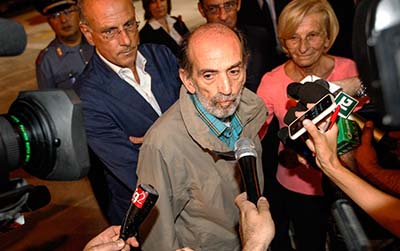Just two weeks ago, I wrote that the recent escapes of American Matthew Schrier and French-American Jonathan Alpeyrie after months of captivity should give hope to all missing journalists in Syria. We now have two more reasons for hope.
Sunday, the Italian and Belgian governments announced that missing Italian journalist Domenico Quirico and Belgian academic writer Pierre Piccinin were freed. They had been missing for five months.
Quirico and Piccinin entered Syria from Lebanon on April 6 and went missing four days later amid intense clashes between rebel forces and the Assad military backed by Lebanese Hezbollah near the city of al-Qusayr.
In media interviews, Piccinin said he and Quirico were captured by rebel forces and turned over to what he called “Islamist bandits.” Surviving in a basement cell during the siege that led to the fall of al-Qusayr to the Assad army, Piccinin and Quirico were transferred first south to Yabroud, near Lebanon, before heading north to Idlib and finally east towards rebel-controlled Raqqa.
Quirico said the pair had been treated poorly, his newspaper La Stampa reported. Piccinin elaborated, saying Quirico had suffered two mock executions. Two failed escape attempts — one leading to two days on the run in the countryside — worsened their treatment, he said.
The Belgian newspaper Le Soir, which has published Piccinin’s work, said Sunday that the Italian government “had spared no effort to free” Quirico and Piccinin. The paper also quoted Belgian Prime Minister Elio Di Rupo, who praised the “good cooperation” between the Belgian and Italian governments,” who have worked hard hand in hand in this delicate matter.”
What role the governments played in securing the release of Quirico and Piccinin is unknown, but they should share any relevant information with key stakeholders seeking the release of other missing journalists in Syria. At least 14 local and international journalists are still unaccounted for in Syria, according to CPJ research.
The recent good news aside, there should be no confusion: journalists face incredible risks reporting from Syria. Those risks were the center of conversation at a recent conference hosted by the Lebanese press freedom group SKeyes. Though hosted by SKeyes and attended by other press freedom groups, the event was really a forum for journalists by journalists.
SKeyes’ Executive Director Ayman Mhanna put it this way: “It was highly important for SKeyes to organize a retreat, in a calm and peaceful environment, for international journalists covering Syria to reflect on the challenges they face on a daily basis. They, better than anyone, could answer critical questions: What are the true security conditions on the ground? What are journalists’ expectations from their employers? What is the best behavior to adopt in case of abduction? What can journalists expect from their governments? What kind of assistance is available for freelance journalists? How can war reporters deal with post-traumatic stress disorder?”
A summary of the ensuing dialogue can be read in SKeyes’ full report available online. One of my key takeaways from the conference is that the situation on the ground has dramatically deteriorated in recent months, and many journalists are reconsidering whether it is worth the risk to enter Syria at all.
Piccinin now believes it’s no longer worth that risk. “It’s become too dangerous for foreigners,” he said in an interview with Le Soir. “The revolution is not what it was.”
But perhaps just as important as what was said at the conference was who was saying it.
The club of international journalists who risk their lives to tell the Syrian story has always been small, but the conference offered an important opportunity to make it a more tight-knit group. While risk is inherent in the work of journalists in Syria, there is no doubt the work becomes safer when journalists collaborate in promoting best practices, sharing the latest developments, drawing on each other’s experiences, and speaking with a common voice.
